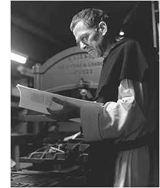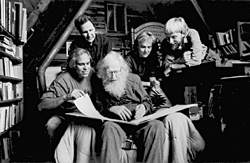|
PHOTO GALLERY
William Everson was born in Sacramento, California in 1912 to
Christian Science parents on a farm near Selma in the San Joaquin
Valley. During the Depression, he attended Fresno State College,
but soon dropped out to devote his life to poetry after discovering
the works of Robinson Jeffers. Everson published his first book
of verse, We Are the Ravens in 1935. During World
War II, he declared himself a conscientious objector and was
placed in a series of work camps in the Pacific Northwest, where
he first learned the art of handset printing and where he also
completed The Residual Years, which brought him
national attention. His marriage did not survive the war.
 After the war, Everson
joined the San Francisco Renaissance movement of poets and anarchists
surrounding Kenneth Rexroth. In 1951,
following his second failed marriage, he entered the Dominican
Order. Donning the traditional Dominican robe and hood, he was
a colorful and widely respected figure in the Beat literary movement
for nearly two decades. He took the name of Brother Antoninus,
under which he became well known. In 1957, after Kenneth
Rexroth's "San Francisco Letter" appeared in the
Evergreen Review, Everson was regarded as one of the San
Francisco Renaissance poets (the Beats) and he was tagged with
the name of "The Beat Friar". After the war, Everson
joined the San Francisco Renaissance movement of poets and anarchists
surrounding Kenneth Rexroth. In 1951,
following his second failed marriage, he entered the Dominican
Order. Donning the traditional Dominican robe and hood, he was
a colorful and widely respected figure in the Beat literary movement
for nearly two decades. He took the name of Brother Antoninus,
under which he became well known. In 1957, after Kenneth
Rexroth's "San Francisco Letter" appeared in the
Evergreen Review, Everson was regarded as one of the San
Francisco Renaissance poets (the Beats) and he was tagged with
the name of "The Beat Friar".
In 1969, having fallen in love with his third wife, Susanna Rickson,
Everson renounced his Dominican calling. Two years later he took
a position at UCSC, where he taught a popular course called "Birth
of a Poet" and founded the University's Lime Kiln Press.
He also established himself as an important literary theorist
with the publication of Archetype West: The Pacific Coast
as a Literary Region.
In 1991, Everson was honored as Artist of the Year by the Santa
Cruz County Arts Commission. Before an overflowing crowd at the
county government center, the buckskin-draped Everson, shaking
violently from advanced Parkinson's Disease and sipping occasionally
from a bottle of Jack Daniels, read from his body of work. "I
love you," he yelled to the adoring crowd at the conclusion
of his reading. "Now go home!"

Everson published over fifty
volumes of poetry as both Everson and Antoninus and was a handpress
printer of worldwide distinction. His honors include a Guggenheim
Fellowship, a Pulitzer nomination, a National Endowment for the
Arts Grant and the PEN Center USA West, Body of Work Award. Although
virtually crippled by the nervous disorder that ultimately took
his life, Everson never lost his zeal for the written word. He
was at work on an epoch biographical poem, "Dust Shall Be
the Serpent's Food", up until his death. Everson passed
away on June 3, 1994 at his rustic cabin he dubbed Kingfisher
Flat, just north of Santa Cruz on the California Coast. He was
81.
Kingfisher
Flat ( Top of Page
)
In the long drought
Impotence clutched on the veins of passion
Encircles our bed, a serpent of stone.
. . . . . . .
I think of the Fisher King,
All his domain parched in a sterile fixation of purpose,
Clenched on the core of the burning question
Gone unasked.
. . . . . . .
Oh, wife and companion!
The ancient taboo hangs over us,
A long suspension tightens its grip
On the seed of my passion and the flower of your hope.
Masks of drought deceive us. An inexorable forbearance
Falsifies the face of things, and makes inflexible
The flow of this life, the movement of this love.
. . . . . . .
I hear quaking grass
Shiver under the windowsill, and out along the road
The ripe mallow and the wild oat
Rustle in the wind. Deeper than the strict
Interdiction of denial or the serpentine coiling of time,
Woman and earth lie sunk in sleep, unsatisfied.
Each holds that bruise to her heart like a stone
And aches for rain.
Seed ( Top of Page )
Some seed in me,
Some troublous birth,
Like an awkward awakening,
stirs into life.
Terrible and instinctive
It touches my guts.
I fear and resist it,
Crouch down on my norms, a man's
Patent assurances.
I don't know its nature.
I have no term for it.
I cannot see its shape.
But, there, inscrutable,
Just underground,
Is the long-avoided tatency.
Like the mushrooms in the oak
wood,
Where the high-sloped mountain
Benches the sea,
When the faint rains of November
Damp down the duff,
Wakening their spores---
Like them,
Gross, thick and compelling,
What I fear and desire
Pokes up its head.
The
Poet Is Dead ( Top of Page
)
(excerpted from a memorial for Robinson Jeffers)
Snow on the headland,
The strangely beautiful
Oblique concurrence,
The strangely beautiful
Setting of death.
The great tongue
Dries in the mouth. I told you.
The voiceless throat
Cools silence. And the sea-granite eyes.
Washed the sibilant waters
That stretched lips kiss peace.
The poet is dead.
Nor will ever again hear the
sea lions
Grunt in the kelp at Point Lobos.
Nor look to the south when the grunion
Run the Pacific, and the plunging
Shearwaters, insatiable,
Stun themselves in the sea. |